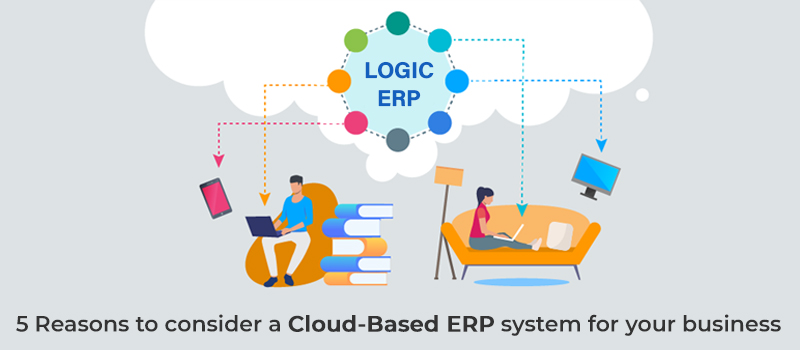

ERP solutions are frequently used by businesses to integrate and organize data across the organization. Firms used to deploy ERP software on their own workstations and other hardware, which is now known as on-premises. Even though these on-premises alternatives enabled businesses to operate more efficiently and yielded significant benefits, they have several shortcomings, most notably in terms of price, agility, and administration. Many of the challenges that occur with on-premises ERP solutions are resolved with cloud-based ERP systems like LOGIC ERP, and they provide a number of advantages over their on-site equivalents. But what is cloud-based ERP, and why would a company want to migrate such a critical business infrastructure to the cloud?
What is Cloud ERP?
A cloud-based ERP system is a collection of enterprise resource planning systems and solutions that your provider hosts and manages offsite in the cloud. You can concentrate more on running your business rather than focusing on the IT administration which involves cloud deployment. The distributor, rather than your company, bears the management and maintenance load with cloud-based SaaS systems. Logic ERP is an example of a service that allows businesses to access the same technology that major corporations do without the high cost.
5 Benefits in Switching to a Cloud ERP System
Security
Some companies are still hesitant to put their economic data on the cloud, due to security concerns as a prime reason. While some may consider this a downside of cloud-based ERP systems, its security is typically greater than that of on-premises ERP systems. Cloud technology today is extremely safe, with multi-factor authentication, cutting-edge encryption, and other important security features incorporated into every component. Furthermore, cloud ERP servers are housed in stable, central locations, reducing the danger of theft and damage. Again, cloud ERP providers can spend additional resources on database, software, and physical security than a single company can be ,due to cost advantage.
Scalability
Cloud ERP systems offer relatively close scalability that is impossible to achieve with on-premises ERP. Scaling on-premises systems necessitates replacing or redesigning several components to match growing demands, which is a time-consuming and pricey task. Cloud solutions’ adaptable nature allows them to scale up or down resource usage as required, allowing the ERP to develop alongside the company. It may readily expand to handle a surge in new employment, a business purchase, or the development of additional product offerings or business divisions. To support corporate growth, the finest tech ERP systems are constructed with a flexible and adaptable architecture. A smart ERP solution, such as LOGIC ERP, will give you the abilities and operations you need right now, as well as those that will help you plan for the future.
Accessibility
Cloud ERP solutions may be accessed from any device connected to the internet and a browser, allowing users to enter, compile, and work collaboratively on data from virtually anywhere. This enables multiple divisions or business units to collaborate across company locations or nations using a specific instance of the programme without the requirement for a dedicated VPN, as is the case with on-premises systems. Furthermore, cloud ERP is less expensive to use because it does not require the purchase and maintenance of an emulation programme or VPN. A cloud ERP also helps key decision-makers to remain connected while traveling or working outside of office hours, and it gives firms access to a bigger talent pool by allowing them to recruit skilled staff more easily.
Implementation
Cloud – based solutions are faster to configure and deploy than on-premises systems, the majority requiring less than 30 days. Because the vendor is in charge of stimulating the hardware and software, this is the case. This reduces downtime while the transition is made and enables organizations to respond quickly to market changes or fulfill increasing demands.
Reduced expenses
The preliminary cost of installing cloud ERP software are substantially lower than those of on-premises systems, as are the capital costs. When you factor in support and maintenance, which is usually 50% of the initial license costs, as well as the costs to maintain and upgrade hardware and the IT staff required to maintain it all, the monthly subscription fee can still be lower after implementation. Smaller businesses who can’t fathom the hefty upfront cost of on-premises ERP, even though the technology would benefit them, may find that minimizing these expenditures is critical.
Conclusion
Every cloud ERP software has its own benefits, and each organization must assess how each entity meets or fails to fulfill its requirements. But they all remain committed to using the potential of cloud-based solutions to propel the ERP software industry forward. Cloud-based ERP systems was an interesting but mostly unknown technology less than a decade ago. It’s evident now that not only is the software ready for prime time, but it’s also on its way to becoming the global standard. LOGIC ERP offers an array of ERP Solutions suites and variants to suit your company’s needs.

